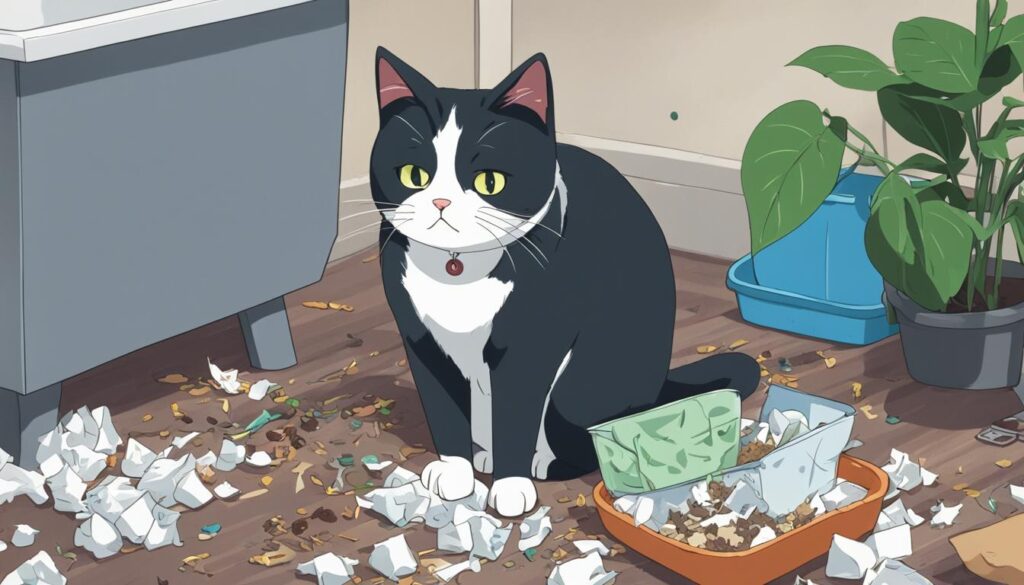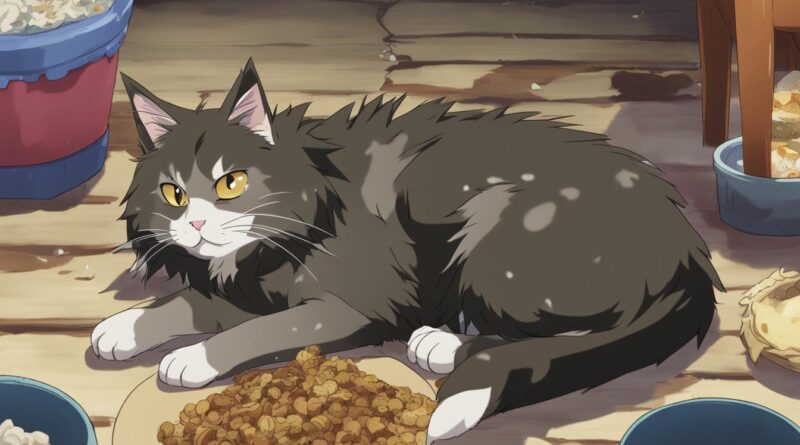Cat Diarrhea and Vomiting: Causes & Remedies
We all want our feline companions to be healthy and happy. However, sometimes cat digestive issues can lead to discomfort and concern. If your cat is experiencing symptoms such as cat diarrhea or cat vomiting, it’s essential to understand the underlying causes and efficient remedies to help them feel better.
In this section, we will explore the most common cat digestive issues, feline diarrhea, and vomiting, and provide practical remedies to help your cat find relief. By following our advice, you can help your cat maintain comfortable and healthy digestion, so let’s get started!
Key Takeaways:
- Understanding the causes of cat diarrhea and vomiting is crucial in finding appropriate remedies.
- Different digestive issues, including gastrointestinal problems, upset stomach, and digestive disorders, can affect cats.
- Consult with your veterinarian for personalized advice and guidance.
- Effective remedies for feline diarrhea and vomiting include dietary adjustments, hydration, and probiotics.
- By addressing the underlying issues, you can help improve your cat’s digestive health and overall well-being.
Understanding Cat Digestive Issues
As pet owners, we understand the importance of digestive health in our furry companions. Cats can experience a range of digestive issues that can affect their overall well-being. Some common cat gastrointestinal problems include an upset stomach, cat digestive disorders, and feline vomiting or diarrhea.
Cat digestive disorders can be caused by a variety of factors, including food allergies or intolerances, infections, parasites, and even stress. These conditions can cause discomfort and lead to more serious health issues if left untreated.
To ensure your cat maintains good digestive health, it’s essential to provide them with a balanced diet that meets their nutritional needs. Additionally, regular exercise and veterinary check-ups can help keep your furry friend healthy and happy.
The Importance of Maintaining Cat Digestive Health
Cats with digestive disorders may experience a range of symptoms, including vomiting, diarrhea, constipation, or loss of appetite. These conditions can be both uncomfortable and concerning for pet owners.
By prioritizing your cat’s digestive health, you can help prevent these issues from occurring and ensure that your feline friend feels their best. A healthy digestive system can contribute to better overall health and longevity for your cat.
One way to maintain cat digestive health is by providing your pet with a high-quality, nutritionally balanced diet. You can also consult your veterinarian for advice on specific digestive health concerns or to develop a customized nutrition plan for your cat.
“Just like humans, cats can experience digestive issues. It’s essential to prioritize our furry friends’ digestive health by providing them with nutritious food, regular exercise and vet check-ups.”
Common Causes of Cat Diarrhea and Vomiting
As pet owners, we know how distressing it can be to see our feline friends suffering from diarrhea or vomiting. In this section, we will explore the common causes of these digestive issues and how to identify them. Understanding the root cause of your cat’s discomfort can help you to provide the necessary care and treatment to alleviate their symptoms.
Dietary Changes
One of the most common causes of cat diarrhea and vomiting is dietary change. Cats have sensitive stomachs, and even a small alteration to their diet can cause digestive distress. If you recently switched to a new brand of food or treats, this could be the culprit. To identify if diet is the issue, try switching back to your cat’s previous food and monitor their symptoms.
Food Intolerance
Cats can also develop food intolerances, causing them to react poorly to certain foods. If your cat experiences diarrhea or vomiting after eating a particular ingredient, like dairy or gluten, you may need to switch to a specially formulated, hypoallergenic diet. Consult your veterinarian for appropriate dietary recommendations.
Infections and Parasites
Infections and parasites, like bacterial infections or roundworms, are other common culprits of cat diarrhea and vomiting. These can be contracted through contaminated water or food, or by coming into contact with infected animals. Proper hygiene, regular deworming, and vaccinations can help prevent these issues from occurring.

Other Factors
Other factors that can cause cat diarrhea and vomiting include stress, certain medications, and underlying medical conditions. If your cat’s symptoms persist or worsen, it’s important to consult with your veterinarian to rule out any underlying health problems and provide appropriate treatment.
Remedies for Cat Diarrhea and Vomiting
When it comes to cat diarrhea and vomiting, there are several remedies you can try at home to help relieve your feline friend’s discomfort.
Hydration is Key
One of the most important things to do when your cat is experiencing diarrhea or vomiting is to keep them hydrated. Encourage them to drink water – you can even try adding low-sodium chicken broth to their water bowl to make it more enticing. You can also try giving them wet food instead of dry food, which has a higher water content and can help keep them hydrated.
Dietary Adjustments
Feline diarrhea and vomiting can often be caused by food intolerance or sudden diet changes. Try switching to a limited-ingredient diet that is less likely to cause digestive upset, and avoid feeding your cat human food or table scraps.
Probiotics
Adding probiotics to your cat’s diet can help promote healthy digestion and prevent diarrhea and vomiting. You can find probiotic supplements specifically designed for cats, or add plain, unsweetened yogurt to their food in small amounts.
Note: Always consult with your vet before adding any new supplements to your cat’s diet.
Medical Intervention
If your cat’s diarrhea and vomiting persist or worsen despite these remedies, it may be time to seek medical intervention. Your vet may prescribe medication to help relieve your cat’s symptoms and address any underlying health issues.
By following these remedies, you can help alleviate your cat’s diarrhea and vomiting, and promote a healthy digestive system.
Conclusion
As responsible pet owners, we understand the importance of maintaining our furry friend’s digestive health. By recognising the common causes of cat diarrhea and vomiting, we can take appropriate action and provide effective remedies to help our feline companions find relief. Remember, it is essential to consult with a veterinarian if your cat experiences persistent gastrointestinal distress to rule out any underlying health issues. Let us work towards keeping our cats healthy and happy.
FAQ
What are the common causes of cat diarrhea?
Common causes of cat diarrhea include dietary changes, food intolerance, infections, parasites, and gastrointestinal disorders. It is essential to identify the underlying cause to effectively treat the diarrhea.
Why is my cat vomiting frequently?
Frequent vomiting in cats can be caused by various factors such as eating too quickly, dietary indiscretion, hairballs, or underlying health issues. If vomiting persists or is accompanied by other symptoms, it is best to consult a veterinarian for a proper diagnosis.
How can I manage cat diarrhea at home?
To manage cat diarrhea at home, you can try feeding a bland diet consisting of boiled chicken and rice, ensuring your cat remains well-hydrated, and incorporating probiotics to restore the balance of gut flora. However, if the diarrhea persists or worsens, it is advisable to seek veterinary advice.
What should I do if my cat has an upset stomach?
If your cat has an upset stomach, it is recommended to withhold food for a few hours to allow their stomach to settle. Afterward, gradually reintroduce small frequent meals of easily digestible food. If the symptoms persist or worsen, consult a veterinarian for further evaluation.
How can I promote my cat’s digestive health?
Promote your cat’s digestive health by providing a balanced diet, avoiding sudden dietary changes, offering plenty of fresh water, and incorporating high-quality probiotics or digestive supplements. Regular veterinary check-ups and preventive care are also important for maintaining optimal digestive health.

